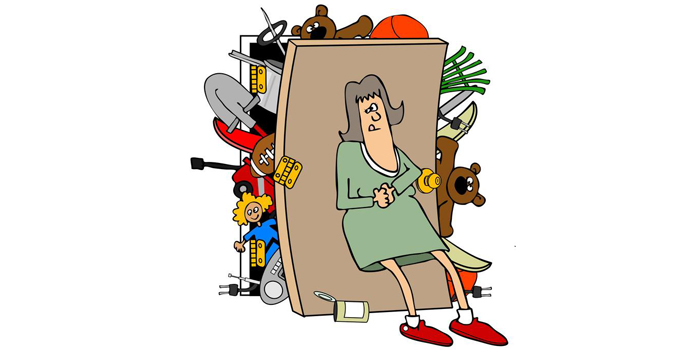Why?
When age prevents many social engagements that seniors have experienced in earlier years, it can create feelings of isolation. The loneliness and separation can beget depression. Some seniors react to this isolation by accumulating things with which they are familiar. This can be anything from newspapers to old clothes to food or too many pets. Keeping these things reduces their anxiety.
Researchers suggest that people who hoard frequently have other cognitive conditions, such as depression, anxiety, obsessive-compulsive or attention deficit disorders.
Dangers
Given that seniors often have mobility issues, excessive clutter significantly increases the possibility of a falling-related injury. Home safety assessments always include pathway clearances. Hoarding can dramatically impact these clearances. Add to this the additional risks of fire hazard, poor sanitary conditions and the resultant poor hygiene and the challenges of hoarding mount up.
Whether caregiving is from a family member or a professional caregiving organization, adequate care cannot be properly delivered in an unsafe, cramped and unsanitary living space. This jeopardizes a senior’s health, safety and independence.
How can a Caregiver Help?
Maybe we start with what NOT to do. Attempting an overt “intervention” involving entering an elder’s home and forcefully disposing of their hoard is usually ineffective. Often after this effort, most people immediately begin hoarding again. The resulting response is often one of hostility and the destruction of trust with the person “helping” them.
The key to altering hoarding behavior is to establish some sort of mutual understanding. In establishing a level of trust, the caregiver can ensure that the elder feels in control of the process of cleaning and organization. Of course, it takes more time than simply going in and “bulldozing”, but it will have a more permanent impact on the situation. The key is to reduce the level of stress associated with getting rid of personal possessions – even if they look very much like trash.
Helping the Caregiver, too
It is also important to acknowledge the emotional health of the helper in this scenario. Hoarders can become very anxious with the idea of parting with or disposing of their possessions. The helper will naturally be the “bad guy” as this plays out. The person initiating this difficult process may need a level of support for him or herself in the form of a supportive family member or even a therapist.
And, keep in mind that such a project often cannot be accomplished all at once. By staging the process, it will reduce the stress for the hoarder and helper alike.

